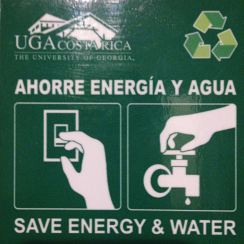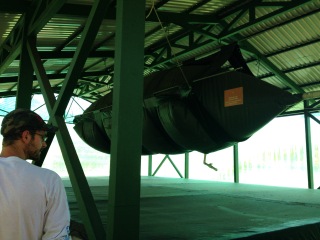 As according to The International Ecotourism Society (TIES) ecotourism is defined as “responsible travel to natural areas that conserves the environment and improves the well-being of local people.”(TIES, 1990) Some of the main focuses in ecotourism are conservation, community, and interpretation. With ecotourism there is an emphasis on preserving what is natural in the world and a priority in the up keep of the culture heritage. Community sustainability also receives additional nourishment. With this people are then able to better interpret the nature, culture and society of communities around the world.
As according to The International Ecotourism Society (TIES) ecotourism is defined as “responsible travel to natural areas that conserves the environment and improves the well-being of local people.”(TIES, 1990) Some of the main focuses in ecotourism are conservation, community, and interpretation. With ecotourism there is an emphasis on preserving what is natural in the world and a priority in the up keep of the culture heritage. Community sustainability also receives additional nourishment. With this people are then able to better interpret the nature, culture and society of communities around the world.
Considering tourism is one of the world’s largest industries it is a great way to also teach people about nature and how to preserve it. With ecotourism there is a large amount of stress put on the travelers not having a negative impact on their surroundings. They must be open-minded to what they experience and show support to the communities they visit. There is a highlight in how the travelers are able to provide benefits to the their surrounding ecosystem and the people who live in it. Conserving and Improving are the spotlights in ecotourism.
Here are some pictures of signs you will find at the University of Georgia’s Costa Rican campus.
So far while we have been in Costa Rica we have seen a few different forms of ecotourism. Our first stop on the 28th was InBioParque. The goal of InBio is to discover and educate people on all the biodiversity in Costa Rica and how it can be used to help humans. On our tour of InBio we got to walk through their premature humid forest and learn about the many species that live here and how some our becoming endangered. We also learned about some of the ways the biodiversity can aid humans with things like medicines. One good example is antivenom which comes from certain snake venom that is then injected into horses which produce the correct antibodies to be used for humans. This is all very beneficial knowledge for both native Costa Ricians and tourists. Since InBio provides these tours for anyone who comes and buys a ticket it is definitely helps to educate people on how to improve Costa Rica and it also promotes conservation of the endangered species. This is all great information for people to have!
Here is a picture of a Malachite butterfly from the butterfly garden at InBio. More than 200 families in Costa Rica benefit from raising butterflies for export and local market (InBio).
Another encounter we have had with ecotourism is staying at The University of Georgia’s Costa Rica campus (UGACR). They are a part of the Certification for Sustainable Tourism program. This program allows the participating programs to minimize their negative impacts they may have on the environment and the surrounding communities. One of the ways UGACR does this is by putting all their human waste through a bio-digester to produce methane gas that they use in their kitchen. They also advocate that it’s guests take shorter showers in order to conserve water. As well as ask that the guest be sure to turn off any lights when they are not using them.
While we stayed at UGACR we also visited Monte Verde to hike it’s trails. This is a large attraction to many visitors to Costa Rica. This helps to shed light on the immense amount of biodiversity there is in Costa Rica so that the travelers understand and can help conserve the wildlife.
At UGACR we also went on a coffee tour of the coffee coop that they have in the area. All the contributors are families that live in the area. On the tour the families allow people on to their properties and into their homes. This really showed us how they live and also helps to support the families’ businesses. This definitely helped us to better understand the nature, culture, and society of the area. It also helps improve the well being of the people living there by showing support for their businesses.
This were all very interesting experiences we had with ecotourism and makes me want to participate in ecotourism as much as I can when traveling.
Another place we stayed at where we encountered ecotourism is Organization of Tropical Studies (OTS) in La Selva. OTS consists of approx. 1600 hectares of protected lowland rainforest. At La Selva any one is able to stay there for any amount of time that they may need. We only stayed for two days but in those days we probably saw the most wildlife of the whole trip. We were able to go on a morning and night hike through the rainforest to see and learn about the species that live there, many of which are endangered. We also got to meet many scientist who were staying at OTS doing research. OTS allows scientists to come and study whatever they want and have grants for in the rainforest. Some projects last months while some go in for years. For example one scientist we talked with is studying the different soundscapes all over the world including at La Selva. This provides a unique experience for travelers and scientists alike who get the chance to stay there. It really opens your eyes to the unique biodiversity found there and the importance it has on the community and even the world. It helps to teach tourists the importance of conservation.

Here is the suspension bridge you have to walk across to cross one of the rivers that runs through La Selva.

Here are some Honduran White Bats in a bat tent that they made out of leaf. This is how the bats sleep during the day. We saw them on our morning hike at OTS. These bats are classified as near-threatened due to rainforest deforestation.
All throughout our trip we saw many local people who had stand to sell the things they made. Many tourist like to buy things from these stands. This helps to support the people and the communities they live in by promoting tourism. Tourism is such a big industry that it is important to try and incorporate things that are important to the environment as well. By doing this many people are taught the importance of conservation, community, and interpretation.
Overall we learned how important it is to travel with open eyes. That is how you will really understand the culture and heritage of where ever you are traveling. This is important because it also helps travelers understand the importance of conservation, community, and interpretation in not only other countries but their own as well.
Sources/Links:
- http://www.ecotourism.org/what-is-ecotourism
- http://www.nature.org/greenliving/what-is-ecotourism.xml
- http://untamedpath.com/eco-tours/eco-travel.shtml
- http://www.inbio.ac.cr/en/
- https://dar.uga.edu/costa_rica/index.php/site/sustainability_initiatives_detail/integrated_farming_system/campus
- http://www.ots.ac.cr/index.php?option=com_wrapper&Itemid=838








December 22, 2014 at 9:04 pm
Awesome! I hope to go soon.
LikeLike
December 24, 2014 at 1:00 pm
We just got back from helping the Shuabb community install water for their eco-lodge! I’ll share the video once I figure out how.
LikeLike
December 27, 2014 at 8:41 am
Awesome, can’t wait to read more about ecotourism!
LikeLike
January 2, 2015 at 12:30 am
I think one of the things that makes Costa Rica very successful at Ecotourism is the immense amount of pride they have in their country and they way they treat their land. The tourism aspect (in terms of bringing in money) seems to be a distant second motive to the desire they have to preserve the ecosystems and have a positive impact. At every place we have visited so far, I have noticed they rarely talk about how profitable something is like we do in the US; the dollar sign is often the most important thing in America, but in CR that doesn’t seem to be the case. I think it clearly shows money isn’t the main motive by looking at ICE, who provides all the power to the country. While weighing the costs associated with different forms of energy is important as an engineer, they have chosen to utilize all kinds of renewable energy in order to be responsible citizens of the earth. In addition to that, most of the other locations we have visited are non-profit, and the speakers have stressed that they are just trying to help educate others in order to achieve a better future for us and the planet. The spirit of respecting and preserving nature here is contagious, and hearing them talk about has made me realize even more how important these things are in engineering, and life. Because of this, ecotourism naturally follows and becomes very successful on its own.
No country is perfect, but Costa Rica sets a good example of what steps can be taken to make the environment a priority in engineering, and daily life. The spirit of respecting and preserving nature here is contagious, and because of this the ecotourism naturally follows and becomes very successful on its own.
LikeLike
January 3, 2015 at 6:59 pm
In Costa Rica many families are using ecotourism as a tool of survival.
The integration of some crops, animals and processes attract tourists.
With the sale of some products, farmers can get money.
The partnership and collaboration between producers is very important.
Language is a major barrier to providing these services and should be improved in this regard.
LikeLike
January 4, 2015 at 4:49 pm
Language is a two-way street. It would be great if learning the native language was more commonly integrated into ecotourism.
LikeLiked by 1 person